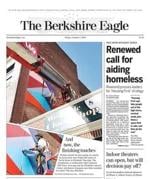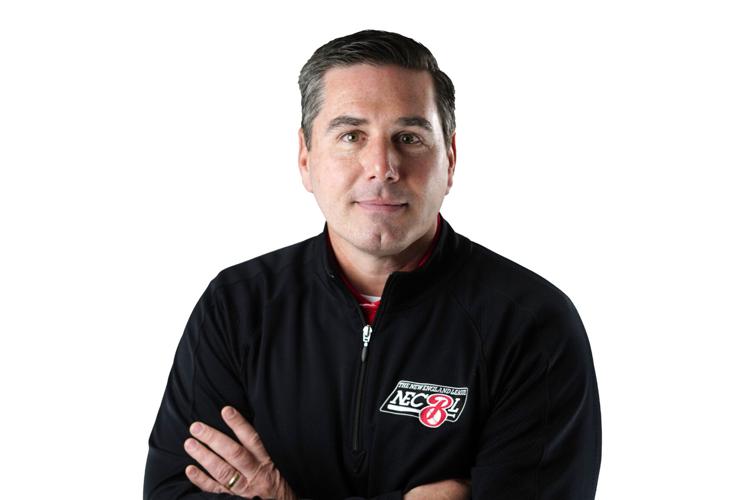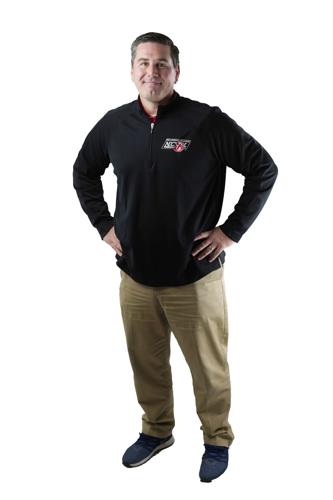PITTSFIELD — One could excuse Sean McGrath if he felt lost last summer.
McGrath, the son of a well-known former Berkshire County high school baseball coach, literally grew up around the game. He played baseball at the youth, high school, collegiate and professional levels, including a short stint — "It may have been two weeks," McGrath said — with the former Pittsfield Mets in 1998.
The North Adams native also coached at the collegiate level, and served as general manager of the the New England Collegiate Baseball League's North Adams SteepleCats before becoming commissioner of the entire 14-team NECBL nine years ago.
That's a lot of baseball.
The NECBL, which also is based in North Adams, didn't play last year because of the COVID-19 pandemic. Suddenly, McGrath had a lot of time to kill.
He doesn't this year. After the forced one-year hiatus, McGrath has been busy preparing the summer collegiate baseball league for its 26th season. This year's 42-game season runs from June 3 to Aug. 1.
We talked with McGrath recently about how he made it through a summer without baseball, how much the game has been a part of his life, the adjustments he made going from the playing field to the front office, and why, in a league where teams constantly change locations, the SteepleCats have stayed successful in North Adams for so long.
Q: Outside of last year, when was the last time you went a whole season without any baseball?
A: That's a great question. I have photos from 1978 when Drury [North Adams' high school] won the state championship and being in the dugout with my father [Tom McGrath] at age 2 at Joe Wolfe Field. So, honestly, it may be back then.
I was always around the program with my father as a batboy and a helper. ... The league [the NECBL] is only 26 years old [27, not counting last year's missed season], and I've been involved as a player, coach, general manager and commissioner for 20 of those years. That even amazes me.
Q: So, what was last year like? What did you do?
A: My yard was in good shape. We grilled out a lot more. I went for bike rides with the kids.
Obviously, with the pandemic we weren't traveling, so, I wasn't nearly spending as much time in the car visiting ballparks. It was a very, very different summer, unlike any I had ever spent. ... But, under the circumstances, I didn't feel like I was missing out on anything. My priorities in life had changed for the time being.
Q: As commissioner, what's it been like getting the NECBL ready for the season after a year when you didn't play?
A: First and foremost, it was making sure our teams came through the pandemic last year. We were able to manage the early part of the pandemic before making the decision to cancel the season.
With our league, we communicated throughout the process, making sure we made the best decisions and the most responsible decisions as well as being respectful of those organizations; they're nonprofit community-based organizations. We were able to avoid a lot of expenses by making decisions at the time that we did, and that actually positioned our teams as well as they could have to navigate the pandemic by avoiding expenses that they didn't need to incur.
I was impressed to see where our teams were coming through that season, being sustainable. We didn't lose a single team.
Q: How about this year?
A: Obviously, coming into this year on the baseball side, it's been fun seeing the passion from the players again, their desire to return to summer collegiate baseball. Often, these players are burnt out by the time their 60- to 70-game college season is over. But, because they missed out last summer, because they're playing abbreviated, modified [college] schedules this year, they're just itching to get back out on the field again and travel.
So, we've had a great turnout, great interest. The talent coming into the NECBL this year is going to be phenomenal. There's more kids wanting to play summer baseball this year and not take time off.
On the organizations front, we [the board of directors] meet throughout the year. We've been planning since September for a full season, so teams began recruiting [players] in August and September. ... Some of those important organizational activities that teams have to take up were definitely postponed a little longer to come though the pandemic. ...
Since President [Joe] Biden's announcement on April 19 about vaccinations, that's opened things up a little bit. Teams are seeing a light at the end of the tunnel. Our organizations have really been busy. They're trying to do maybe six months' worth of work in two-and-a-half months.
Q: Why did you want to stay in baseball, at the administrative level, after your playing career was over?
A: It's always been in my genes. It's always been a part of my life. It was hard enough retiring from baseball and knowing that I'm not going to be in the dugout and putting on the cleats and going to spring training and being ready to play. That was a big adjustment.
I totally enjoyed the adjustment to coaching, probably more than I had imagined [McGrath served as an assistant coach at Williams College after his playing career was over] because, as a player, you only think about playing. ...
I was married. I had my first daughter, then I had my second daughter. Life as an assistant coach in college can be challenging on many levels, so, I just walked away from coaching at Williams. Thankfully, the SteepleCats were a thriving organization in the community. Being a general manager allowed me to be around the dugout a little bit, to go the games and talk to the players and have those conversations with the coaches. ... I feel at home on the sidelines, on the diamond.
Q: How does the game differ when you're an executive?
A: There are certain things that happen during a game where I wish I had the ability to teach or train or talk through whether it's the mental part of the game or the physical part of the game ... but what I've been exposed to is probably more than I would have imagined.
I have regular meetings with representatives from the Major League Baseball commissioner's office. We call and exchange emails. We talk about rule changes. ... What's new this year in the NECBL is, if you walk into any of our ballparks, there'll be six high-speed cameras recording every angle and aspect of the batter and the pitchers throughout every game. Every at-bat, every swing, every pitch will be captured on video. ...
That will go to all the Major League Baseball clubs for their staff to evaluate. ... Our teams, for the first time, will have access to that data so they'll be able to self-scout.
Q: Everybody in your league has aspirations to go further in baseball. Do you?
A: When I retired from playing and began coaching at Williams, I started having a family, and my wife and I made North Adams our home, and we're proud to be natives and residents of the Berkshires.
She's a teacher, and I'm happily employed at Williams College [as director of the Parents Fund and athletic giving]. We enjoy our roles here. I've never really thought about using this experience as a launching pad for a different career path.
Q: The NECBL was originally interested in placing a team in Pittsfield before it chose North Adams in 2002. Why has summer collegiate baseball done so well there?
A: It all comes down to the community. ... In 2002, when Joe Wolfe Field was [drawing] 1,200 or 1,500 fans, it was unbelievable [McGrath served as the SteepleCats' hitting coach during their inaugural season].
As a local, I was ecstatic at how the community embraced the team. Having that beginning was important, and where we are today, it's truly because of the local sponsors, the host families and the fans, because in these organizations no one is making a living off the New England Collegiate Baseball League. ... It's truly a belief that this is good for these college players, and it's good for the community.



